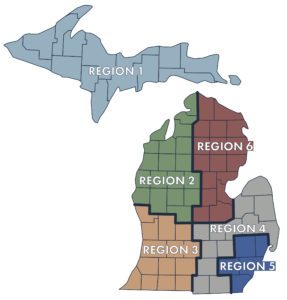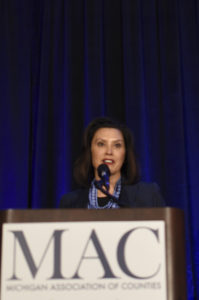
Each summer, MAC offers a series of one-day “mini conferences” at key locations around Michigan. These are designed for busy commissioners and administrators and include intensive briefings on trending issues in county governance.
This year’s schedule and locations are:
- June 6: Escanaba, Quality Inn
- June 11: Grand Rapids, Crowne Plaza on 28th Street
- June 18: Gaylord, Treetops Resort
- July 23: Frankenmuth, Bavarian Inn
Each summit starts at 9 a.m. and finishes at 3 p.m. Cost is $25 and includes snacks and a lunch.
CLICK HERE to register.
Topics this year are wide-ranging, offering something of interest to every county and commissioner:
Tips for Running Efficient, Effective Meetings (all sites)

Time is a precious resource, especially for elected officials. Each minute spent in an unproductive meeting is a lost minute of community outreach and engagement. Fortunately, there are tips and tricks to running an efficient and productive meeting, helping lead to optimal governance. In this session, learn about ways to handle unexpected scenarios at a county meeting, as well as best practices for chairs and vice chairs. With solid objectives, a tight agenda, and a commitment to preparation, you will be well on your way to chairing great meetings.
(This session is part of MAC’s “Better Commissioner” program of continuing education for county officials.)
Managing Liability and Risks in County Government (all sites)
 (UPDATED)
(UPDATED)
An attorney working with the Michigan Municipal Risk Management Authority, the largest provider of property and casualty insurance to counties in Michigan, will give an overview of best practices and points to consider on sexual harassment in the workplace and how public leaders can combat it.
The Mechanics of Millage Elections (all sites)

In this session, attendees will learn from Grassroots Midwest, a Lansing-based consulting firm, on the five key elements of a successful millage or bond proposal:
-Define the needs of the community
-Craft the core message
-Develop a media/communications campaign
-Contact/educate relevant stakeholders
-Get out the vote
Grassroots specializes in strategic planning to assist associations, municipalities and corporations organize and manage contact with policy makers, interest groups and voters.
(This session is part of MAC’s “Better Commissioner” program of continuing education for county officials.)
The Issues of a Statewide Septic Code (all sites)

Michigan’s groundwater, rivers, lakes and streams are vulnerable to E. coli, in many cases due to failing on-site sewage treatment systems. Many counties have programs to address the inspection and the integrity of the septic tanks, but many do not. Bills in the Legislature would enact a statewide system for the approval and evaluation of these on-site sewage treatment systems. This presentation will discuss the environmental and health problems associated with the failure of these systems and the potential solutions for addressing the shortfalls.
Broadband Policies and Rural Michigan (Escanaba and Frankenmuth only)

This session will focus on rural development with an emphasis on rural connectivity. Due to the natural barriers that exist in our rural areas, access to services such as rural broadband presents an uphill challenge to our rural communities in retaining and attract businesses to create vibrant economies. Learn about ideas and ongoing initiatives and programs that may be available to help local communities be part of the global economy.
Building a Better Community “Habitat” (Grand Rapids and Gaylord only)

Habitat Oakland County teamed up with a local partnership from the church community, the chamber of commerce, a local marketing business and schools to create a community-based service project. In this session, learn from representatives on how they worked to obtain foreclosed properties and renovate them, thereby leading to higher property values and healthier neighborhoods. Presenters also will explain how any community can use their collaboration model to create a better “habitat.”
 At the 2019 Michigan Counties Conference, MAC members will vote on five seats on the MAC Board of Directors.
At the 2019 Michigan Counties Conference, MAC members will vote on five seats on the MAC Board of Directors.
 More than 300 county leaders from across Michigan heard Gov. Gretchen Whitmer make her case for increased infrastructure funding, arguing that Michigan must fund such work “at the pump.”
More than 300 county leaders from across Michigan heard Gov. Gretchen Whitmer make her case for increased infrastructure funding, arguing that Michigan must fund such work “at the pump.”



 (UPDATED)
(UPDATED)










